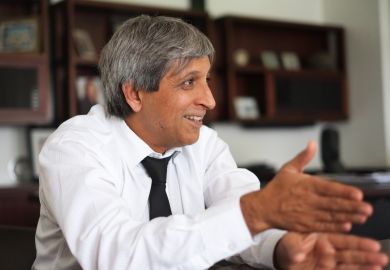If you thought that area studies sounded like an odd name for an odd discipline, you’d be right.
Its genesis reflects an enduring tension within academia between supposedly systematic (“disciplinary”) and geographically specific knowledge production – deriving from particular histories of how universities evolved in Euro-America and its former imperial and colonial realms.
An illustration of that can be found in the fact that I never encountered the term “area studies” until I arrived in the UK from South Africa to study for my second degree. Its continued existence in the West – and identification with particular global regions for which deep knowledge of different geographies, histories, cultures and languages is essential – reflects the dominance of institutional structures, behaviour and curricula by highly asymmetrical hierarchies of power and knowledge production over half a century since the end of the main waves of European decolonisation.
Hence, while Anna McKie’s recent feature in Times Higher Education “How should universities tackle decolonisation?” was otherwise excellent, its comprehensiveness was compromised by its neglect of this additional challenge: overcoming the vested interests of the most powerful and supposedly “knowledgeable” in terms of how subjects and approaches are defined.
So how might we move forward? Recognising and labelling research specifically about Europe or North America as European or North American studies respectively might enable us superficially to regard that particular playing field as having been levelled. However, that would not address the deeper problem of how area studies is often regarded as inferior: an esoteric minority interest in relation to the supposed disciplinary “mainstream”, where theoretical and conceptual innovation are held to take place.
For instance, it was common until recently for academics to assert that area studies is far more descriptive and less critical than those “mainstream” subjects – although little evidence nowadays supports such contentions. This constitutes a form of intellectual “othering” that many of us working in disciplinary departments and with committed research interests in one or more regions are all too familiar with. It is particularly salient in recommendations or instructions of where (not) to publish in order to maximise the prospects of high departmental rankings in institutional and national research assessment exercises – even where an area studies panel or category has been introduced to address earlier criticisms of its neglect.
Some concerned scholars have considered whether area studies needs its own specific theories, in order to affirm the rigour and validity of regionally focused research. But they have generally concluded that the subject should, instead, be seen as an important route for testing and modifying general concepts. Indeed, that is always what it has been: most articles published in area studies journals, after all, are written from the perspective of a single discipline, in terms both of the material presented and the authors’ institutional affiliations.
By the same token, the claim sometimes made that interdisciplinarity is a particular strength of area studies is distinctly debatable. It is extremely rare for area studies journals to publish debates or symposia in which several colleagues bring their respective disciplinary perspectives to bear on a contemporary issue so that the whole might become more than the sum of the parts. Hence, it would be more accurate to describe these journals as predominantly multi- rather than interdisciplinary.
Furthermore, many published contributions to debates about area studies over time have been written largely from the perspective of a single academic discipline. This is not to denigrate these contributions, but merely to flag that many academics work within implicit or explicit disciplinary constraints. As the depth and diversity of knowledge expand ever faster, the challenge of escaping our respective disciplinary silos and/or geographical ghettos is becoming more difficult.
Yet its simultaneously growing importance is recognised by the research funders, both national and multilateral, that nowadays routinely require interdisciplinary and combined North-South teams or consortia of applicants for larger grants. While sometimes expedient or seeking to be politically correct, this often reflects a genuine appreciation of the real-world complexities and inequalities being addressed, particularly when an applied policy or practice element is included.
Increasing demands for transdisciplinary teams bring together academics and those with various combinations of policy and practice expertise and/or local connections. However, these approaches are not yet well explained in the funders’ instructions or widely understood, so many superficially “participatory” exercises are being inaccurately portrayed as examples of co-production, co-design or co-creation with local communities.
Such approaches do not deny the value of individual academic disciplines or geographically specific and different indigenous or other knowledges. On the contrary, they provide one basis for integrating them flexibly and respectfully through building a shared sense of ownership and involvement, and thereby increasingly transcending the outdated hierarchies or binaries that still underpin most debates about area studies.
If these approaches become more widely deployed and valued, they could in time make a real contribution to post- and decolonial methodologies. They could also redefine university assessment procedures and perhaps even institutional structures and intellectual practices.
Is it too much to hope that one day soon, the concept of area studies, as a separate little academic backwater, will have no greater currency in the UK than it does in South Africa and elsewhere in the previously colonised world?
David Simon is professor of development geography at Royal Holloway, University of London.
Register to continue
Why register?
- Registration is free and only takes a moment
- Once registered, you can read 3 articles a month
- Sign up for our newsletter
Subscribe
Or subscribe for unlimited access to:
- Unlimited access to news, views, insights & reviews
- Digital editions
- Digital access to THE’s university and college rankings analysis
Already registered or a current subscriber?




